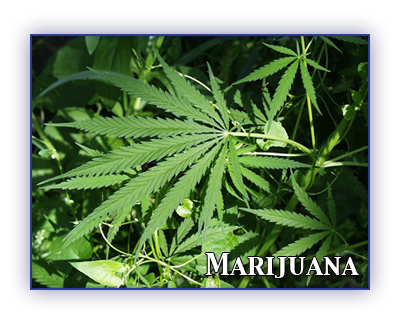What is Marijuana?
Marijuana is a green, brown, or gray mixture of dried, shredded leaves, stems, seeds, and flowers of the hemp plant (Cannabis sativa). Before the 1960s, many Americans had never heard of marijuana, but today it is the most often used illegal drug in the United States.
Cannabis is a term that refers to marijuana and other drugs made from the same plant. Strong forms of cannabis include sinsemilla (sin-seh-me-yah), hashish (“hash” for short), and hash oil. All forms of cannabis are mind-altering (psychoactive) drugs; they all contain THC (delta-9-tetrahydrocannabinol), the main active chemical in marijuana. They also contain more than 400 other chemicals.
Short-Term Effects
- Distorted perception (sights, sounds, time, touch)
- Problems with memory and learning
- Loss of coordination
- Trouble with thinking and problem-solving
- Increased heart rate, reduced blood pressure
Sometimes marijuana use can also produce anxiety, fear, distrust, or panic.
Effects on the Brain
The active ingredient in marijuana, delta-9 tetrahydrocannabinol or THC, acts on cannabinoid receptors on nerve cells and influences the activity of those cells. Some brain areas have many cannabinoid receptors, but other areas of the brain have few or none at all. Many cannabinoid receptors are found in the parts of the brain that influence pleasure, memory, thought, concentration, sensory and time perception, and coordinated movement.
When high doses of marijuana are used, usually when eaten in food rather than smoked, users can experience the following symptoms:
- Hallucinations
- Delusions
- Impaired memory
- Disorientation
Effects on the Heart
Within a few minutes after smoking marijuana, the heart begins beating more rapidly and the blood pressure drops. Marijuana can cause the heart beat to increase by 20 to 50 beats per minute, and can increase even more if other drugs are used at the same time.
Because of the lower blood pressure and higher heart rate, researchers found that users’ risk for a heart attack is four times higher within the first hour after smoking marijuana.
Effects on the Lungs
Smoking marijuana, even infrequently, can cause burning and stinging of the mouth and throat, and cause heavy coughing. Scientists have found that regular marijuana smokers can experience the same respiratory problems as tobacco smokers do, including:
- Daily cough and phlegm production
- More frequent acute chest illnesses
- Increased risk of lung infections
- Obstructed airways
Marijuana contains more carcinogenic hydrocarbons than tobacco smoke and because marijuana smokers usually inhale deeper and hold the smoke in their lungs longer than tobacco smokers, their lungs are exposed to those carcinogenic properties longer.
One study found that marijuana smokers were three times more likely to develop cancer of the head or neck than non-smokers. Many researchers believe than smoking marijuana is overall more harmful to the lungs than smoking tobacco.

